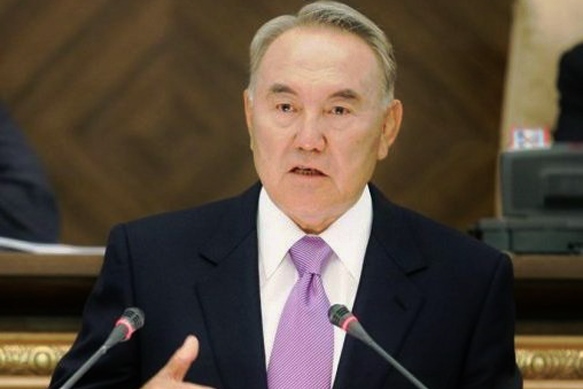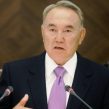
Kazakhstan to Pursue Key Socioeconomic Reforms in 2014
Publication: Eurasia Daily Monitor Volume: 11 Issue: 1
By:

Following the publication of the “Kazakhstan-2050” strategy late in 2012, Central Asia’s biggest country carried out a series of structural reforms in 2013 aimed at modernizing its economic and social systems and optimizing its public finances. On January 16, President Nursultan Nazarbayev announced the creation of the Ministry of Regional Development tasked with identifying new growth opportunities in Kazakhstani provinces, in the context of widening income disparities at the local level (Interfax.ru, January 16, 2013).
While, with the introduction of revised selection and remuneration procedures, important changes later occurred in the recruitment of public servants, last year’s highlight was undoubtedly the ambitious pension reform. On June 21, Nazarbayev signed into law a new pension bill raising women’s legal retirement age from 58 to 63 years, on a par with that of male workers. According to the government, this measure would help to balance the budget as women’s life expectancy has increased substantially in recent years (Tengrinews.kz, June 21, 2013).
However, the highly unpopular proposal raised some eyebrows and even led to episodic street protests staged by women’s organizations across the country. During his televised address to the nation, President Nazarbayev promptly criticized the government’s “poor presentation work” before dismissing his recently appointed Labor Protection Minister Serik Abdenov. As per the amended draft of the bill suggested by the president himself, women’s pensionable age will now be annually raised by a half-year, starting in 2018 instead of 2014, as was initially planned (Zakon.kz, June 10, 2013).
Furthermore, as of last August, the pension legislative package also included the establishment of a single pension fund operated by Kazakhstan’s National Bank on behalf of the government. While the effective launch of this structure is expected not earlier than spring 2014, it has already started to take some $23.8 billion worth of available pension assets over from private funds. By doing so, Kazakhstani authorities hope to improve the quality and safety of pension savings management, whereas the possibility of further investing them into costly infrastructure projects is also under consideration (Tengrinews.kz, August 8, 2013).
On the economic front, Kazakhstan’s GDP grew by 6 percent in January–December 2013, up from 5 percent in 2012 but below its neighbors’ economic performance: over 7 percent for Uzbekistan and Tajikistan, some 10 percent for Turkmenistan and almost 11 percent for Kyrgyzstan. Despite the fact that the country did well in oil production, which actually increased by 3.5 percent to 82 million tons in annual terms, the faltering launch of commercial production at the Kashagan oilfield came as a disappointment for both the government and foreign investors. In late September and again in early October, the North Caspian Operating Company (NCOC), officially in charge of this giant project, had to suspend the pumping of oil due to unforeseen technical problems (Rbc.ru, December 25, 2013; News.nur.kz, December 13, 2013; Tengrinews.kz, October 11, 2013).
However, operations should resume early this year and further boost the growth of the Kazakhstani economy. Moreover, the entry of China’s CNPC into the exploitation of the oilfield, for which Beijing paid some $5.5 billion and offered additional investment guarantees, has been widely viewed as a positive development. From a geopolitical perspective, this change of ownership is set to further strengthen Beijing’s clout in its western neighbor’s lucrative energy sector, to the detriment of New Delhi whose plans to gain a foothold at Kashagan were previously regarded as highly promising (Rosbalt.ru, September 9, 2013).
In security matters, the year 2013 was a relatively tranquil one for Kazakhstan. With no terrorist attacks reported by the media, the country still saw the adoption of several new laws aiming to improve the prevention and disruption of terrorist and extremist activities. Following January’s pinpoint amendments to the existing legislation regarding the prevention of terrorist operations, President Nazarbayev decreed in July the creation of a brand new anti-terrorist center under Kazakhstan’s National Security Committee. At the same time, regional anti-terrorist commissions were gradually set up in various parts of the country. Later, in October, the Kazakhstani president also approved the 2013–2017 Program against terrorism and religious extremism scheduled to receive over $1.3 billion of public funding (Meta.kz, October 2, 2013; Nomad.su, June 24, 2013; Tengrinews.kz, January 4, 2013).
Following a period of increased pressure in 2012, Kazakhstan’s political opposition was dealt another heavy blow with the arrest on July 31 of Mukhtar Ablyazov, the former CEO of BTA, a major private bank. Considered President Nazarbayev’s number one enemy, Ablyazov is accused in his home country of large-scale fraud and money laundering to the tune of $6 billion. While he is also wanted in Russia, Ukraine and some European countries where his bank was previously engaged in dubious transactions, Ablyazov’s extradition from France remains a highly sensitive issue. Currently, the French court expects to pronounce its final verdict early this year, with the exiled oligarch’s supporters already denouncing eventual “politically motivated persecution,” should the banker be extradited back to Kazakhstan. In either case, the extra-parliamentary opposition remains disarmed and desperately lacks funding (Interfax.ru, December 12, 2013; Gazeta.ru, July 31, 2013).
The year 2014 is likely to see the issue of a post-Nazarbayev power transition rise to the top of the country’s domestic agenda. When the president appointed last October a new speaker of the Senate, a government position officially second in line of succession, this move reignited speculation as to the probability of Nazarbayev’s forthcoming departure. However, Kassym-Zhomart Tokayev, a former United Nations diplomat and Kazakhstan’s foreign minister, already served in this capacity and is more of a neutral political figure than a prospective contender for the highest office (Regnum.ru, October 16, 2013).
With growing succession rumors bubbling in the background, Kazakhstan is further set to pursue its talks with Russia and Belarus regarding the establishment of the Eurasian Union. In May 2014, the three countries will be signing its founding treaty. Still, the many contradictions in their respective approaches to the trilateral Customs Union may reasonably complicate Moscow’s geostrategic plans for the former Soviet space (RIA Novosti, December 24, 2013).




